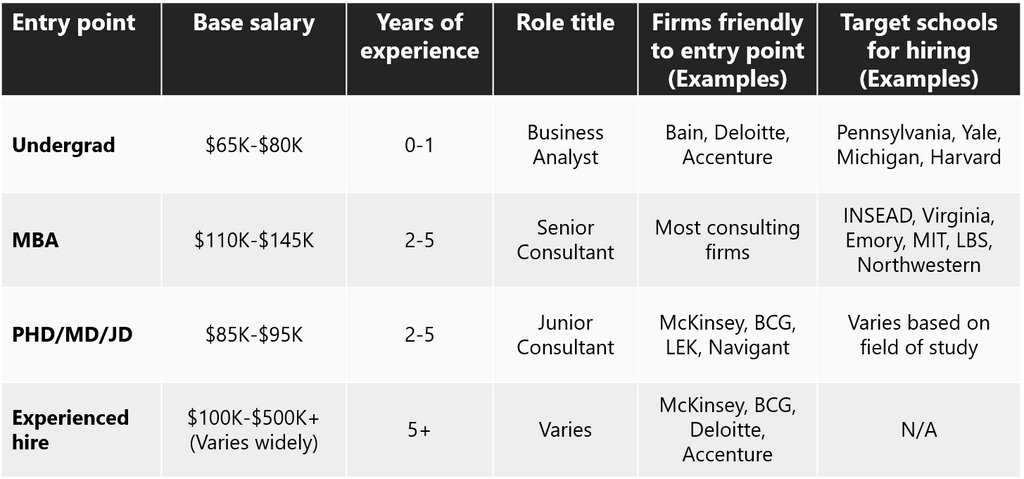
Working in a graduate programme consulting firm has several advantages. This article will explain the role, responsibilities, and salary of a graduate programme consultant. It will also explain how to get into this kind of consultancy and why it's an attractive career choice. This article provides information on the job description and salary scales of graduate program consultants. These are just a few of the many benefits that come with working in a graduate-programme consulting firm. Continue reading for more information.
Benefits of working as a consultant in a graduate program
Graduate programme consulting offers many benefits, such as the ability to learn from and expand an organization's expertise. Graduate consultants can expect to do everything from preparing briefing materials for consulting teams to conducting interviews with clients. They can gain practical experience and certifications to help them in their applications. These are just a few benefits to working in a graduate consultant program.

Opportunities for networking - Many graduate programs offer mentoring opportunities that allow participants to make new contacts within their organization. Ben was paired during the graduate programme with a senior member. This provided him valuable work experience in a certain area of business. Other employers often pair graduates with experienced staff members, which can be beneficial for their professional and career development. Rotating through an organization can also be a great benefit.
The duties of a consultant to a graduate program
Graduate consultants analyze financial data and identify ways to lower overheads and increase profit margins. They offer suggestions for ways to improve production and reduce costs. Graduate consultants provide guidance and assessment of the effectiveness of the strategies, as well as supervision of the implementation. Additionally, they conduct interviews to gather information and analyse it. These tasks are crucial for a business, especially in a competitive market.
Graduate consultants can specialize in many fields including IT, economics and business. A degree in a relevant subject such as economics, geography, geophysics, or business is usually enough, though a 2:1 is beneficial. It is also desirable to have work experience as a graduate trainee. They can also apply for positions based on certifications, which help them stand out from the competition.
Salary for graduate programme consultant
The salaries of graduate programme consultants vary from one country or the other. Germany, for instance, pays 23% higher than the UK. The Middle East, however, only pays slightly more. The UK has lower salaries than other countries, but UK graduates pay 45% higher in taxes than their counterparts from other countries. This can be offset by UK consultants' greater access and ability to attract top talent for a much lower salary.

Many graduate employers offer many benefits, such as free meals, subsidised exercise classes, Friday drinks, and breakfast. Graduates can also move into permanent employment, such as in management or technology consulting. Some agencies even offer flexible working hours and sabbaticals. Others, such as BCG, have a flexible leave policy and allow their consultants to work part-time during the week.
FAQ
What was the origin of modern consultancy?
The first consultants were actually accountants who would help companies manage their finances. Because they were skilled in managing financial information, they became "accounting consulting". But, their role soon expanded to other areas such as human resource management.
The term "consultant" came from the French word for "to advise." It was used by businessmen to describe someone who could offer advice on how to run an organization. Many business owners use the term "consultant" to describe any professional advisor.
How is consulting different from freelancing
Freelancers are individuals who work for themselves and offer their services to clients. They charge hourly rates depending on the amount of time spent on a client's projects. Consultants work for companies and agencies that employ them. Consultants are typically paid either monthly or annually.
Because they set their own hours and prices, freelancers are often more flexible than consultants. Consultants, however, often have better benefits such as retirement plans, vacation days, and health insurance.
How do I become a successful consultant?
Find an area that you are passionate about. Then you have to build relationships. You need to know what clients want and how they operate. And finally, you must deliver results for them.
While you don't need to be the best at all things, it is important to be better than others. You must also have passion for your work. It's not enough to just say "I want to be a consultant." You have to believe in yourself, and in what you are doing.
What happens after the consultant has finished the job?
After the consultant finishes the work, s/he will send a final report outlining the results. This report includes the deliverables and project timelines.
Then, you'll review the report and decide whether the consultant met your expectations. If the report does not meet your expectations, you have two options: to request changes or to terminate the contract.
Are you a qualified consultant?
Studying a subject deeply and then applying your knowledge is the best way for you to become an expert.
Learn how to be a great consultant by studying now!
You may not be able to get hired if you don't have relevant experience but a degree. However, if you can demonstrate that you've studied the same subjects as those who got the jobs, you could still apply.
Employers are always looking for people with real-world knowledge.
Statistics
- So, if you help your clients increase their sales by 33%, then use a word like “revolution” instead of “increase.” (consultingsuccess.com)
- Over 62% of consultants were dissatisfied with their former jobs before starting their consulting business. (consultingsuccess.com)
- "From there, I told them my rates were going up 25%, this is the new hourly rate, and every single one of them said 'done, fine.' (nerdwallet.com)
- On average, your program increases the sales team's performance by 33%. (consultingsuccess.com)
- Over 50% of consultants get their first consulting client through a referral from their network. (consultingsuccess.com)
External Links
How To
How can I find a good consultant for my business?
The first step in finding a good consultant is understanding what you want from your consultant. What do you need them to do for your website? Are you looking for them to help optimize your website to rank higher on search engines? Maybe you want someone to check on your current hosting provider and tell you if it is in need of improvement. You need to know what kind of services you want, and then you can begin looking at other companies. Many consultants claim that they can offer these services. But only a small percentage of them are able to deliver. How do I choose one? Here are some tips to help you choose a consultant.
-
Get referrals. This is the best way to select a consultant. You shouldn't hire someone you haven’t met before as they will probably charge you too much. However, you shouldn't work with someone with poor reputations. You're fortunate enough to receive referrals from people you trust. You can check online reviews even if they don't refer you. You can find testimonials and case studies from clients who have used your service.
-
Ask around. Many people are not aware of the benefits of hiring a consultant. People believe they don't have to make any changes because they are currently doing well. However, this is usually untrue. Even if results are good, there is a chance you haven’t been keeping up-to-date with new trends and technologies. And if you're relying on outdated methods, you'll miss out on opportunities to grow your business. It is always worthwhile to ask around for recommendations of good consultants.
-
Make sure to verify their qualifications. When you're looking for a consultant, it doesn't matter whether you're building a small blog or launching a multi-million dollar eCommerce store; you want to be sure that whoever you hire has the skills needed to handle your project. Make sure that they're qualified to perform the tasks you need to be done and that they have sufficient expertise in the area.
-
Find out what kind of projects they specialize in. You might think that everyone can handle all projects, but this is false. Some areas require specific types of training or education. A developer who is a specialist in Drupal would not be able to help you build a WordPress theme. The same goes for graphic design, programming languages, etc. It is important to inquire about the types of projects that they work on.
-
You should know their prices. You don't want a consultant who charges too much. But you also don't want to pay too little either. Consultants come in all shapes and sizes. Some bill hourly, while others are charged per project. Knowing exactly what you're paying upfront will save you money down the road.
-
Know what they offer. Are they available for free consultations Will they give you advice on how to set up your own system? Do they promise that your site will rank higher once you have worked with them? You can cancel the consultation without penalty if your opinion is not what you wanted.
-
Finally, find out if they offer discounts for multiple months or years. Many consultants offer discounted pricing over extended periods. Although you do not have to commit to a year, it is possible to take advantage of any offers they may offer.